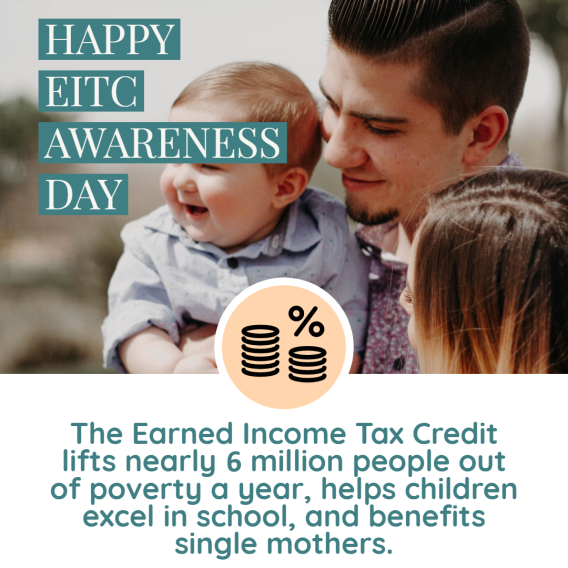The Earned Income Tax Credit (EITC) is a tax credit that may give you money back at tax time or lower the federal taxes you owe. You can claim the credit whether you’re single or married, or have children or not. The main requirement is that you must earn money from a job.
The credit can get rid of any federal tax you owe at tax time. If the EITC amount is more than what you owe in taxes, you get the money back in your tax refund. If you qualify for the credit, you can still get a refund even if you do not owe income tax.
You may qualify for the federal EITC if you work in the U.S. or the following U.S. Commonwealths and territories: Puerto Rico, U.S. Virgin Islands, Guam, the Commonwealth of the Northern Marina Islands, or American Samoa.
Beyond the federal EITC, 31 states plus D.C. and Puerto Rico have their own state EITCs. Check out the state EITC map to see if your state offers a tax credit.
Click on any of the following links to jump to a section:
How much can I get with the EITC?
The credit amount depends on your income, marital status, and family size. In 2023, the credit is worth up to $7,430. The credit amount rises with earned income until it reaches a maximum amount, then gradually phases out. Families with more children are eligible for higher credit amounts.
The Earned Income Tax Credit in Tax Year 2023
| Number of children: | Single workers with income less than: | Married workers with income less than: | EITC up to: |
| 3 or more children | $56,838 | $63,398 | $7,430 |
| 2 children | $52,918 | $59,478 | $6,604 |
| 1 child | $46,560 | $53,120 | $3,995 |
| No children | $17,640 | $24,210 | $600 |
You cannot get the EITC if you have investment income of more than $11,000 in 2023. Investment income includes taxable interest, tax-exempt interest, and capital gain distributions.
Am I eligible for the EITC?
There are three main requirements to claim the EITC:
- Income: You need to work and earn income. Your work doesn’t have to be year-round. Your earnings cannot be more than the amounts in the chart above, including investment income. Earned income can be from wages, salary, tips, employer-based disability, self-employment income, military pay, or union strike benefits.
- Taxpayer Identification Number: You need to have Social Security numbers that permit work for you, your spouse, and any children claimed for the EITC. You do not need to be a citizen to claim the EITC if you have a Social Security Number. You cannot claim the federal EITC if you file your taxes with an Individual Taxpayer Identification Number (ITIN). For more information, please see Tax Filing with Immigrant or DACA Status.
- You may be able to get the state EITC with an ITIN if you live in: California, Colorado, The District of Columbia, Illinois, Maine, Maryland, New Mexico, Oregon, or Washington.
- Qualifying Child: If you claim children for the EITC, they must be a “qualifying child”. See the next section details.
Other eligibility requirements include:
- Worker’s Age: You must be between the ages of 25 and 64 if you are not claiming children.
- Qualifying Child Without a Social Security Number: You can claim the EITC for workers without children if you have a qualifying child for the EITC who doesn’t have a Social Security number.
- Married Filing Separately: Generally, you cannot claim the EITC if you are married filing separately. You may still qualify for the EITC if you are married filing separately and:
- Your qualifying child lives with you for more than six months of the year
- You meet at least one of the following requirements:
- You and the qualifying child do not live with your spouse during the last six months of the taxable year
- You and your spouse have a separation decree, instrument, or agreement (not a divorce decree) and do not live together at the end of the year
Note: Filing taxes as married filing separately may affect your eligibility for other tax benefits. Please talk to a tax professional if you need help figuring out your filing status.
Does my child qualify for the EITC?
If you claim children as part of your EITC, they must pass three tests to be a “qualifying child”:
- Relationship: The child must be your son, daughter, grandchild, stepchild or adopted child; younger sibling, step-sibling, half-sibling, or their descendant; or a foster child placed with you by a government agency.
- Age: The child must be under 19, under 24 if a full-time student, or any age if totally and permanently disabled.
- Residency: The child must live with you in the U.S. for more than half the year. Time living together doesn’t have to be continuous. For example, a qualifying child could live with you January through March, and September through December.
How do I claim the EITC?
To claim the EITC, you must file a tax return. If you are claiming a child for the EITC, you also need to submit “Schedule EIC”.
Going to a paid tax preparer is expensive and reduces the amount of your tax refund. Luckily, there are free options available. You can visit a Volunteer Income Tax Assistance (VITA) site or GetYourRefund.org to have IRS-certified volunteers accurately file your taxes for free. You can also visit MyFreeTaxes.com to file your own taxes for free online.
Does my state have an EITC?
Many states have their own version of the federal EITC that can add more money to your tax refund. Most states match a percentage of your federal credit amount. Find out if your state has a state-level tax credit.
Can I still get the 2021 Expanded EITC?
Yes. It’s not too late to claim your 2021 EITC if you haven’t already. To claim your 2021 EITC, you must file a 2021 tax return by April 18, 2025. If you filed a 2021 tax return but didn’t get the EITC and were eligible for it, you can amend your tax return.
Contact your local Volunteer Income Tax Assistance (VITA) site to see if they file 2021 tax returns. You can also use GetYourRefund.org.
Learn more about filing prior year tax returns.
The 2021 American Rescue Plan included 2 one-year EITC expansions:
- If You Have No Qualifying Children
You may qualify for the EITC if you are 19 years old or older and not a student. There are two exceptions:
- Workers who are 19-23 and were a full- or part-time student for more than 5 months in 2021 do not qualify.
- Qualified homeless youth or former foster youth who are at least 18 years old and work are eligible even if they are a student.
If you are filing taxes for the first time, these resources may be helpful:
- Tax Filing and Tax Credits for Young Adults: John Burton Advocates for Youth have created several resources for young adults, including a guide to tax credits and a tax checklist. Many of these resources are also available in Spanish.
- Earned Income Tax Credit Guide that focuses on former foster and youth experiencing homelessness from SchoolHouse Connection.
- Taxes FAQ for young adults with experience in foster care or homelessness
- If Your 2021 Income is Lower Than Your 2019 Income
If your income in 2021 is less than your 2019 income, you can use your 2019 earned income to calculate your EITC. Choose the year that gives you the bigger refund. If you are married filing jointly, the total earned 2019 income refers to the sum of each spouse’s earned income in 2019.










